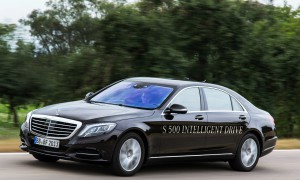
Mercedes secured an autonomous vehicle testing permit in California. It also plans to conduct much of its U.S. testing at a secure facility in southern California.
The Germans are coming! The Germans are coming! Well, actually, they’ve been approved to be here and in California, specifically. Mercedes-Benz is the second automaker – after Audi – to get approved for autonomous vehicle testing in The Golden State.
California has allowed limited use of its roads for automated vehicle testing in recent years, but the laws approved by the state legislature in mid-September were established in 2012 by Gov. Jerry Brown.
Actually, the maker has been testing on public roads for much of September, but the company now has secured the use of the Concord Naval Weapons Station (CNWS) in southern California to test much of its future technology.
“We can use the test site in Concord, California, to run simulation tests with self-driving vehicles in a secure way, including specific hazardous situations,” said Dr. Axel Gern, head of autonomous driving at Mercedes-Benz Research and Development North America, Inc.
“Taken in conjunction with the results of our test drives on public roads, these tests will help us with the ongoing development of our autonomous cars.”
The focus of research nevertheless continues to lie on the tests undertaken in a real-life environment, he added.
(Audi secures first driverless car permit in California. For more, Click Here.)
“Real life” is the key phrase. Mercedes is going to perform the bulk of its testing and development at the southern California naval base. It has a testing site that features a network of surfaced roads resembling an urban grid plan, making it an ideal location for testing autonomously driving vehicles in surroundings that are as close to real life as they can be.
(Click Here for details about Ford stock getting drilled for two days.)
For security reasons the testing ground, which is operated by the U.S. Navy in conjunction with the City of Concord and the Contra Costa County Transportation Authority, is not accessible to the public. With a test area covering 2,100 acres, the CNWS site is currently the largest and most secure test bed site in the U.S., according to Mercedes.
(To see more about U.S. auto sales last month, Click Here.)
The site is similar to the University of Michigan’s Mobility Transformation Center in Ann Arbor, Michigan, which used by the school and several other automakers to perform similar tasks.
Part of that research includes the study of 3,000 cars called the Connected Vehicle Safety Pilot Model Deployment, a U.S. Department of Transportation (DOT)-sponsored program designed to demonstrate connected-vehicle technologies in a real-world, multimodal environment covering 73 miles of roads in northern Ann Arbor dubbed the Mobility Transformation Facility. It is expected to open this fall.
